|
|
|
Sort Order |
|
|
|
Items / Page
|
|
|
|
|
|
|
| Srl | Item |
| 1 |
ID:
190058


|
|
|
|
|
| Summary/Abstract |
Literature on European security and defence cooperation usually asserts that differences in national security interests and security cultures prevent agreement beyond the “lowest common denominator”. I propose that it is possible for states to agree on mutually binding commitments also in this policy field. Using Nordic security and defence cooperation as a case study, I examine what characterises their mutual commitments and how we might account for them. The article adds to the literature on European security and defence cooperation by suggesting that binding commitments in security and defence would not have come about in the Nordic context without a sense of “Nordic togetherness”. This conclusion is important because it demonstrates that a shared sense of identity and norms is significant for understanding how security and defence cooperation between states is possible.
|
|
|
|
|
|
|
|
|
|
|
|
|
|
|
|
| 2 |
ID:
190059
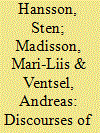

|
|
|
|
|
| Summary/Abstract |
Governments spread strategic narratives via media to influence foreign audiences and policy makers. A frequent but understudied feature of strategic narratives is the discursive construction of blame. In this article, we use the coverage of the adoption of 5G cellular technology in Russian state-funded news portals as an example to show how to interpret blame narratives about international security issues. We combine methods and insights from the discourse-analytic studies of blame and the research into the uses of strategic narratives in international relations to reveal how various articulations of blame are used to (de)legitimise particular actors and actions, sow discord, and foster alliances. Our analysis sheds new light on blame discourses that are more sophisticated and indirect than straightforward accusations and may serve multiple strategic goals at once. It also contributes to scholarship on Russia’s strategic communication about China as well as the United States and its allies.
|
|
|
|
|
|
|
|
|
|
|
|
|
|
|
|
| 3 |
ID:
190056
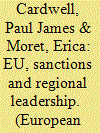

|
|
|
|
|
| Summary/Abstract |
Sanctions have become the “go to” mechanism for addressing foreign and security challenges in the international arena. The European Union’s willingness to impose autonomous (or unilateral) restrictive measures on third countries, and in particular on Russia, has come to the fore at a time when the uptake of new sanctions through the United Nations (UN) framework has stalled. This trend appears to reflect a growing ability to forge consensus among the EU's Member States and use its economic power to support its foreign policy goals. This article considers the extent to which the EU has succeeded in forging a leadership role in sanctions for itself among non-EU states. It examines the alignment or adoption by non-Member States with its sanctions regimes and finds that the EU has a demonstrable claim to regional, if not yet global, leadership.
|
|
|
|
|
|
|
|
|
|
|
|
|
|
|
|
| 4 |
ID:
190063
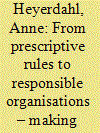

|
|
|
|
|
| Summary/Abstract |
Protective security management aims at protecting against malicious acts. It has, in a relatively short period, undergone substantial changes. One such change is the introduction of risk management. This article investigates a debate about a standard for security risk assessment (SRA) in Norway. It focuses on sense-making by security professionals, drawing on a unique interview material. The analysis utilises Michael Power’s theory on risk governance, as well as insights from security studies. A central finding is that the SRA approach was introduced to create more analytical security management. The importance of analysing one’s values (assets) makes it key to scrutinise the organisation’s characteristics, goals and vulnerabilities, regarded as moving security management in the direction of corporate governance. The article investigates how understanding of risk assessment and security interplay, and identifies a tension between risk (assessment) and the goal of protection, which makes security management risk averse. A requirement of creating sound security is viewed as a potential for burdensome organisational responsibility and blame. The analysis identifies elements of what is often described as resilience (attention towards vulnerabilities), but without the political reading (neo-liberal abdication of the state), thus contributing to the literature on resilience.
|
|
|
|
|
|
|
|
|
|
|
|
|
|
|
|
| 5 |
ID:
190061
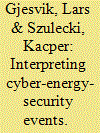

|
|
|
|
|
| Summary/Abstract |
The digitalisation of the energy system brings out the question of cyber threats. How this area is perceived and how cyber-security policy in the energy sector develops is driven by the most spectacular cyber-incidents. How do these events shape public perceptions about the dangers of digitalisation? To understand this, we look at the 2016 CrashOverride cyberattack on Ukraine’s grid. Hypothesising that cyber-energy security incidents are interpreted in the context of socio-technical imaginaries of the energy sector and security imaginaries linked to foreign policy, we distil four discourses that emerged around the Ukraine attack among Western experts and commentators. One represented it as evidence of an accelerating race towards disaster, another as merely a tip of the iceberg. The third portrayed it as less catastrophic than initially suggested, while the last one as part of Russia’s cyber strategy. Not all of these were picked up by the broader public debate in Western security circles, and only the more alarmist discourses had a visible impact beyond niche communities.
|
|
|
|
|
|
|
|
|
|
|
|
|
|
|
|
| 6 |
ID:
190057
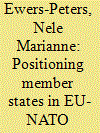

|
|
|
|
|
| Summary/Abstract |
With the growing density and the plethora of security organisations on the regional and international level, the research programme on interorganisational relations has received increasing scholarly attention. The complexity of European security – in light of the Ukraine conflict since 2014, Russia’s more assertive foreign policy behaviour, and on-going crisis management operations in the Africa, the Mediterranean Sea and Middle East – has revived EU-NATO cooperation. The analysis from the perspective of member states and how they can be positioned in the EU-NATO interorganisational relations, however, has received little exploration. This article, therefore, addresses the roles and positions of member states within the relations between the EU and NATO as Europe’s prime security organisations. Member states have numerous political strategies at their disposal to trigger, strengthen or obstruct interorganisational relations, ranging from forum-shopping to hostage-taking and brokering. Drawing on insights from regime theory, network analysis, organisation theory and interorganisationalism, this article proposes a typology of member states in EU-NATO cooperation. Against the backdrop of this special relationship, the typology is developed which aims to detect and illustrate member states’ positions and strategies.
|
|
|
|
|
|
|
|
|
|
|
|
|
|
|
|
| 7 |
ID:
190062


|
|
|
|
|
| Summary/Abstract |
This article evaluates the presence of framing mechanisms in Dutch media reporting on the Second Karabakh war. The paper is led by the following questions: To what extent, and why, does the reporting of the Dutch press favour/undermine certain actors in the conflict? What kind of framing patterns are involved in generating such partiality? And did the frames change over the course of the war? In order to evaluate the presence of framing mechanisms in Dutch media reporting on the second Karabakh war, this research conducted a qualitative data analysis of 188 articles on the topic in nine major national Dutch news media. The paper finds that Dutch newspapers created a rather stereotypical, simplified picture of the Second Karabakh war. There are instances where the reporting gave the impression of a possible bias or overemphasis on certain dimensions.
|
|
|
|
|
|
|
|
|
|
|
|
|
|
|
|
|
|
|
|
|